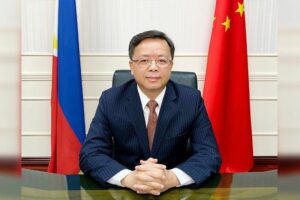NATIONS that misjudge China risk missing out on opportunities as it sets an ambitious economic expansion target of about 5% this year, according to its top envoy in Manila.
“Talking down on China will only backfire, and misjudging China will only squander opportunities,” Chinese Ambassador to the Philippines Huang Xilian told a forum on Philippine-China relations in Quezon City on Thursday, based on a copy of a speech sent by the Chinese Embassy via Viber.
His remarks come just days after US Secretary of State Antony Blinken visited Manila to reaffirm America’s “ironclad” commitments to defend the Philippines against an armed attack in the South China Sea.
Philippine President Ferdinand R. Marcos, Jr. on Tuesday said the threat from China’s expansive claims in the South China Sea is growing, and that his country must do more to defend its territory.
Chinese Premier Li Qiang first announced the growth target early this month to boost confidence in China’s economy as it deals with deflationary pressures, a struggling property sector, an exodus of foreign capital, a stock market rout and a record-low birth rate.
The Chinese Embassy on Wednesday said the US should stop stirring up trouble by taking sides in the sea dispute between China and the Philippines. It also opposed the “groundless accusations made by Secretary Blinken about China’s legitimate and lawful actions in the South China Sea and his thinly veiled threat to invoke the so-called Mutual Defense Treaty obligations.”
In his speech, Mr. Huang said China’s expected growth target this year “far exceeds” the International Monetary Fund’s growth forecast for the US and the European Union (EU). Its economy will have become twice the size of that of the Philippines by yearend.
He said the Chinese economy has been showing positive signals since the start of the year, including a 7.7% increase in domestic tourist spending during the Chinese New Year to 632.6 billion yuan (P4.9 trillion) from 2019.
In the first two months this year, China’s total trade in goods rose by 8.7% from a year earlier to 6.61 trillion yuan.
“As China’s economy grows with a sound momentum, stability and confidence will be injected into the development of the world economy,” Mr. Huang said.
He added that despite different national conditions and systems, China and the Philippines pursue similar development goals, complement each other’s strengths and have “enormous potential for mutually beneficial cooperation.”
The Chinese envoy said China has been the Philippines’ biggest trading partner for eight straight years, and one of its biggest sources of foreign investments.
“The Chinese and the Philippine economy are both part of the global value, industrial and supply chains,” he said. “We have formed a deeply intertwined pattern of interests.”
“The government needs to continue protecting its political sovereignty in the West Philippine Sea,” Leonardo A. Lanzona, who teaches economics at the Ateneo de Manila University, said in a Facebook Messenger Chat, referring to areas of the South China Sea within the Philippines’ exclusive economic zone.
He said the Marcos government should break its trade dependency on China for political pressure to be more effective. “We need to revive our manufacturing sector and attract more foreign investments. All this posturing against China and publicized negotiations with other countries will be useless unless we strengthen our domestic economy, which up to now remains hallow.”
China’s warning on missed opportunities is “a frank and straightforward pacifist encouragement for other countries like the Philippines to not engage in China-bashing and US/Western-praising,” Bienvenido S. Oplas, Jr., founder of think tank Minimal Government Thinkers, said in via Viber.
He said the economic performance of G7 (Group of Seven) last year was mediocre except for Canada and the US. “That means developing countries like the Philippines can’t expect much from them in terms of export absorption. Whereas China and India’s growth would be high — 5% and 7%, respectively.”
“The Chinese ambassador was talking economics and business, while the US State secretary was talking about militarism and war mongering,” he added. — Norman P. Aquino and John Victor D. Ordoñez

